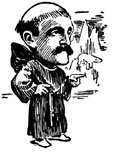
The Fr. Richard Rohr Phenomenon
FOR THE SIMPLE-MINDED
During the past few years, I’ve noticed among Catholic circles a marked increase in the attention paid to the work of Fr. Richard Rohr. Back in the late 1980s and early 1990s, Fr. Rohr wrote and spoke often on the Enneagram, but lately he seems to have abandoned “personality spirituality” for the now-popular “male spirituality.” Through several recent visits to my own diocese, Rohr has attracted quite a local following. So, in order to better understand the increasing “Rohr phenomenon,” I decided to purchase his most recent book, Adam’s Return, and attend a conference given by him titled “Men Matter: A Quest for the True Self.” Surprisingly, there were over 400 people in attendance, some having traveled hundreds of miles to be there. After reading the book, going through a few of his other writings, and then listening to his presentations, I have come to believe that Fr. Richard Rohr adheres to some very questionable, if not dangerous, beliefs. Although most of what he says and writes may appear harmless to most people, the discerning Catholic reader will notice that underneath the surface lie ideas and opinions, some of them fundamental to Rohr’s message, that reside outside of the realm of orthodox Catholic teaching. I would like to look at a few of these ideas here.
You May Also Enjoy
Under John Cardinal Dearden, the Archdiocese of Detroit was one of the most famously “liberal”…
The 'price' of religious faith, conversion, and change of life is far too much to ask according to most moderns, who prefer the spiritual quick-fix.
God's mercy is unfathomable, and He is truly the Good Father who knows how to give what's best to His children.

